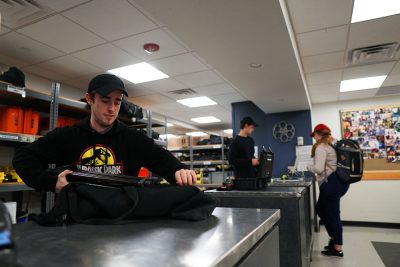
College of Communication students have had fewer opportunities and less time to use rental equipment — such as cameras and microphones — from Field Production Services this Fall.
Reservations must now be made 24 hours in advance to allow for equipment to self-decontaminate, and is to be used only for class assignments for a period of up to seven days, according to an email sent to COM students before the semester started.
Previously, equipment could be reserved as late as three hours in advance and used for up to three days.
Brad Fernandes, director of technology at COM, said there are advantages and disadvantages to the new protocols.
“Even though it’s a lot tighter this year,” Fernandes said, “the amount of issues with the checkouts has gone down drastically.”
The new reservation time restrictions, Fernandes said, have made it easier to process returned equipment and prepare them for new reservations without being rushed. In spite of this, he said, it has also made some aspects less efficient.
“The biggest hindrance here is the 24-hour self-decontaminate time,” Fernandes said. “That really puts a crimp on everything.”
Fernandes cited a total of 1,301 checkouts with 9,091 items circulated as of Tuesday, which he said is lower than previous semesters. Despite this, he said, he thinks students benefit from the program.
“With the exception of a few weekends and a few hiccups here and there,” Fernandes said, “we delivered a service that hopefully the students really appreciated.”
Fernandes said another challenge was overcoming the cut to student workers. He said FPS normally has 10–12 work study students, but COVID-19 regulations forced it to downsize to two full-time staff.
Vivian Shinder, who is one of two remaining technicians at FPS, wrote in an email the previous system often led to students forming a line that reached outside the door as they all arrived at the same time.
“It is easier for us to get all the reservations ready on time when there are only five pickup slots per hour,” wrote Shinder, a 2019 COM alumna, “compared to before when we allowed an unlimited number of reservations per hour.”
Students cannot always get exactly the equipment they want under the new system, Shinder wrote, so FPS tries its best to accommodate their preferences.
“We try to substitute equipment that is functionally equivalent to what they originally needed,” Shinder wrote.
Fernandes said FPS plans to maintain the same protocols for the upcoming semester. He added he hopes professors would “stagger” assignments so students can get the equipment they need, particularly for film production classes.
“If every student is expected to record some sound using the microphone kits, there was a shortage of those,” Fernandes said. “We’re hoping that next semester that the faculty learned about the limitations.”
BU spokesperson Colin Riley wrote in an email these regulations are in line with general University policies.
“It makes sense to ensure that all routine practices – such as using university equipment, computers, etc. – in schools and colleges are reviewed and modified to adhere to the best public health practices to keep from spreading the COVID virus,” Riley wrote.
Fernandes sent an email Monday to those who utilized FPS this semester, stating Wednesday will be the last day for equipment checkouts and that all equipment must be returned by 5 p.m. the next day. Gear will not be available at all between Friday and Jan. 25, with no exceptions.
James Lenahan, a senior majoring in film and television, wrote in an email he is grateful for the services FPS has provided, but dislikes that equipment is not accessible for students’ personal use.
“I have mixed feelings because they are being supportive during COVID and reliable for equipment rentals now,” Lenahan wrote, “but there is definitely still resentment on my end and that is shared by a number of people in the film department.”
Second-year COM graduate student Paige Colley said while she has had limited problems this semester, she has had to rent different equipment than initially preferred due to the 24-hour self-decontamination period. She added COVID-19 research suggests the coronavirus is primarily airborne, so less emphasis can be placed on surface contact.
“I think keeping the physical distancing is important,” Colley said, “but in terms of letting things sit for that long, I think that’s something that they could probably shift away from going forward.”
COM senior Sanjana Kumar, a teaching assistant for a film production class, said picking up equipment for her job was simple and easy, as she retrieved equipment that was already ordered. However, she said, she has had more issues when renting for personal use.
“When I have rented stuff individually, I have found that some things are missing or some camera parts are not there,” Kumar said, “like batteries and small things like that.”
Kumar added FPS has been accommodating this semester, and that Fernandes in particular has been responsive and helpful when she sends questions or requests.
“They are understaffed, and there’s a lot of cleaning that goes into equipment now,” Kumar said, “but I think he has at least helped me out.”





















































































































